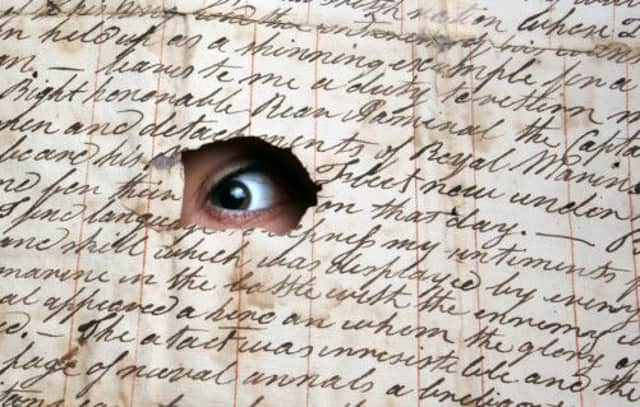Edinburgh naval officer’s Trafalgar letter found


Midshipman James Robinson’s letter to his mother - sent just eight days after the Royal Navy’s iconic victory - was put on display at an auction house in Edinburgh ahead of it going under the hammer next week.
Described as “remarkable” by Lyon & Turnbull, which is selling the letter, it is said to be in relatively good condition.
Advertisement
Hide AdThe writing, scribbled on pages torn from a register of service personnel, is fairly legible, if the punctuation is perhaps not up to modern-day standards.
The letter - in which he assures his mother he is “perfectly well” - is being put up for sale by an un-named relative after being passed through several generations of his family.
He gives a vivid account of the battle, writing “victory has at last given me an opportunity of writing you a victory fatal and glorious which you shall judge by the following account.”
Experts believe it is likely his family would have been unaware he had survived the battle, which saw the British navy fight it out with the Franco-Spanish armada, until the letter arrived.
The missive also includes a copied-out message from Nelson’s successor after his death in the battle, Admiral Collingwood, which was written to the British fleets following the battle in the waters off Cape Trafalgar, in the Spanish province of Cadiz, on 21 October 1805.
Lyon and Turnbull expects the letter to raise up to £800 at its auction of rare books, manuscripts and maps on Tuesday.
Advertisement
Hide AdIts catalogue describes it as “an exceptional document which gives a first hand account of one of Britain’s most celebrated naval victories and gives the reader some idea of the general euphoria felt by the winning party following the Battle of Trafalgar.”
Cathy Marsden, a book specialist at the auctioneers, said: “We know from the vendor that it’s a letter to his mother, who was living in the Clermiston area of Edinburgh at the time, although it is only addressed to a Mrs Robinson.
Advertisement
Hide Ad“A letter to his father is already held in archives of the National Maritime Museum in Greenwich, which we heard about through the vendor. It’s really interesting that there are two letters on the same subject by the same person to a different parent.
“We know he wrote the letter in Gibraltar, where he was stationed eight days after the Battle of Trafalgar.
“It has had a few repairs done to it, but one of the interesting things is that he wrote it on pages from a services register, but the paper used for that would have been fairly durable.
“We are expecting a lot of interest from private collectors as well as military museums, but we won’t really know until the day.”
Some 1,700 British sailors were killed or wounded, with 6,000 enemy casualties and nearly 20,000 prisoners.
Military experts believe almost a third of Nelson’s men were Scots, with five of his 27 ships commanded by Scots.
Advertisement
Hide AdResearch published nine years ago revealed that up to 30 per cent of Nelson’s 17,000 crewmen, and a much higher percentage of his skilled core crew of petty officers and seafarers, were Scottish.
Military historian Stuart Crawford said: “You have to remember that not everyone could read and write in those days and a midshipman was a junior officer, so to get a first-hand account of Trafalgar like this is pretty special.
Advertisement
Hide Ad“This is likely to have been the first news his family received that he was safe and well after the battle.
“I wouldn’t want to splash out the money on it myself, but I’d certainly hope it is the kind of thing that could be secured for the nation.”
EXTRACT [sic]
We engaged five ships at one time Captain Duff realised about with steady fortitude and said my God what shall we do there is a Spanish three decker raking us ahead a French one under the stern in a few minutes our port was totally cleared the quarter deck and forcastle nearly the same only the Boatswain and myself and three men left alive it was then the gallant Captain fell I saw him fall his head and neck were taken entirely off his body when the men heard it they held his dead body up and gave three cheers to show they were not discouraged by it and then returned to their guns we fought two hours and a half without intermission and when the smoke cleared away we found five ships had sunk...